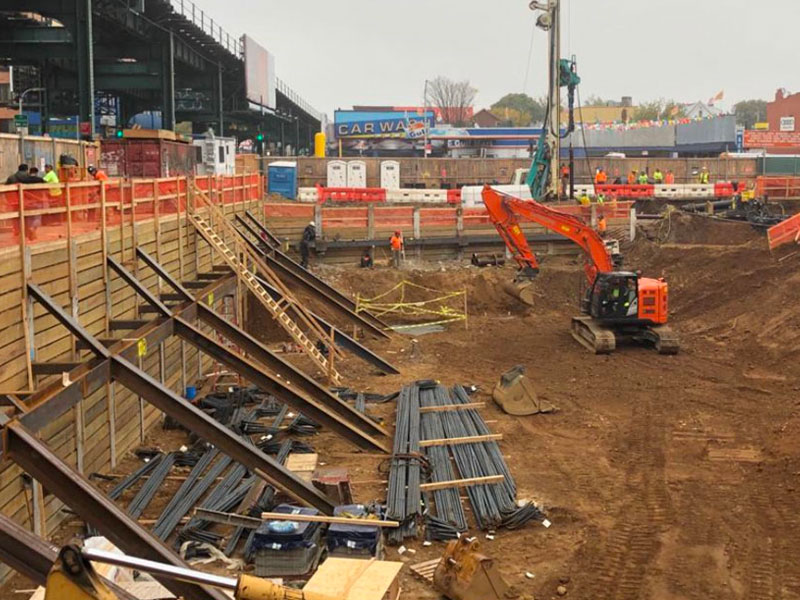Ideal Dump Truck Companies in Ohio - Top-Rated Dump Truck Providers
Wiki Article
Comprehensive Excavation Techniques: Grasping the Principles for Success
In the world of construction and civil engineering, the importance of effective excavation techniques can not be overstated. The cautious planning, precise implementation, and precise interest to detail required in excavation jobs demand an extensive method that encompasses various fundamental elements. From preliminary soil evaluation to the implementation of precaution and normal development monitoring, grasping these core components is vital for accomplishing success in any excavation venture. The true proficiency exists not just in recognizing these principles but in seamlessly incorporating them to navigate the complexities of excavation tasks with finesse.Understanding Excavation Project Planning

Successful excavation jobs are built on the foundation of careful and detailed preparation. The preliminary stage of any type of excavation job is the drawing board, where critical decisions are made that can substantially impact the end result of the task. During this phase, it is vital to collect all relevant details concerning the site, consisting of topographical studies, dirt composition, and any type of prospective threats that might exist. Understanding the task timeline, scope, and budget plan constraints is vital for developing a detailed excavation strategy that makes sure the job's success.
One key facet of excavation task preparation is the growth of a comprehensive timeline that lays out the sequence of due dates, turning points, and activities. By carefully thinking about all these factors during the planning stage, excavation projects can be executed effectively and properly, leading to successful end results - lancaster excavation.
Dirt Analysis and Site Examination
Carrying out thorough soil analysis and site evaluation is an important action in the preparation stage of any type of excavation job. Soil analysis involves identifying the structure, framework, and buildings of the soil at the excavation site. This info is vital for understanding the dirt's bearing capability, dampness web content, and potential for disintegration, which are key elements in determining the excavation approaches and equipment needed for the task.Site evaluation goes beyond dirt analysis and includes a wider evaluation of the overall website problems. This examination includes recognizing any kind of possible threats, such as underground utilities, environmental concerns, or unstable surface, that might affect the excavation process. By completely reviewing the website, task supervisors can develop efficient excavation methods that focus on safety and security, performance, and environmental management.
Using sophisticated technologies like ground-penetrating radar, dirt tasting, and drone studies can improve the accuracy and efficiency of dirt analysis and site analysis. Investing time and resources in these preliminary steps can eventually conserve time and avoid pricey hold-ups or difficulties throughout the excavation process.
Equipment Option and Usage
Efficient excavation jobs depend greatly on critical devices option and application to guarantee ideal performance and performance. Picking the appropriate equipment for the job is essential in taking full advantage of effectiveness and reducing downtime. Aspects such as the kind of dirt, depth of excavation, and job range play a considerable duty in identifying the most ideal equipment for the job handy.
Along with selecting the appropriate tools, correct usage is vital to job success. Operators must be trained to manage the equipment securely and successfully - lancaster trenching. Routine maintenance checks and timely fixings help stop failures and make sure constant performance throughout the project
Precaution and Regulations Compliance
In the realm of excavation projects, prioritizing precaution and compliance with laws is extremely important to guaranteeing a legally sound and protected functional atmosphere. Precaution incorporate a series of methods, including carrying out complete website assessments, executing correct signs and obstacles, and offering appropriate safety training for all employees included in the excavation procedure. Adherence to regulations, such as OSHA requirements in the USA, guarantees that the excavation job fulfills the essential requirements to shield workers, onlookers, and the surrounding environment.
Tracking Progression and Adjusting Methods
Exactly how read more can project supervisors effectively track the advancement of excavation tasks and adjust their strategies accordingly to maximize results? Monitoring development is important for making sure that excavation tasks remain on track and fulfill target dates. Job managers can make use of various tools and techniques to track development, such as daily progress reports, regular website evaluations, and advanced tracking innovations like drones and general practitioners tracking systems. By continuously keeping track of the task's improvement, managers can recognize any kind of possible delays or concerns at an early stage and take proactive procedures to resolve them.
Verdict
To conclude, mastering the principles of thorough excavation strategies is crucial for the success of any kind of task. By comprehending task planning, assessing dirt and website problems, selecting suitable equipment, adhering to safety regulations, and checking progression, job managers can make sure a efficient and smooth excavation procedure. Implementing these techniques will cause effective outcomes and minimize possible dangers or troubles throughout the excavation job.
The first phase of any type of excavation project is the preparation phase, where important decisions are made that can considerably impact the outcome of the job. Recognizing the task spending plan, scope, and timeline restraints is important for creating an extensive excavation plan that makes sure the job's success.
Just how can predict managers effectively track the advancement of excavation projects and adjust their approaches accordingly to enhance outcomes? By very closely keeping an eye on progress and being prepared to adapt methods, task supervisors can improve the overall success of excavation jobs.
By understanding project preparation, analyzing dirt and website conditions, choosing important site suitable equipment, abiding with security guidelines, important link and monitoring progression, project managers can make sure a efficient and smooth excavation process.
Report this wiki page